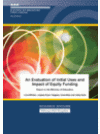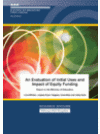This report presents the results of a research study that examined parental decision making in relation to the use of Early Childhood Education services.
The study involved qualitative interviews with 30 parents with a preschool aged child. This was followed by a questionnaire survey of parents of preschool aged children from throughout New Zealand . This survey explored attitudes to children’s learning outside the home, reasons for using Early Childhood Education services, factors important in deciding whether or not to use Early Childhood Education services and factors important in choosing between different types of service. Parents were also asked about their use of services and how they might judge the quality of services.
Parents’ decisions to use Early Childhood Education services depend on the perceived need for some educational experience for children outside the home. For those families where the mother is in paid employment the need for childcare while working is also an important influence on the use of services. However, even if they have a need for Early Childhood Education services parents will only use them if services of sufficient quality are available. For lower income families the cost of the service and the availability of subsidies are important factors and for Māori children the availability of culturally appropriate services is important.
Having decided to use Early Childhood Education services parents must then decide which type of service to use. Once again the quality of different services is the most important factor taken into consideration by parents when choosing a service. Finding a service that matches their child’s age, needs and abilities is also very important to parents and most parents prefer a service that has an educational focus. For some parents, the philosophy of the provider is important, but other parents do not consider this an important consideration. Practical considerations, such as opening hours, flexible use and service location, are also important, particularly for those who are working.
These results would suggest that in order to increase participation in early childhood education it is important to have a range of high quality services available to parents. Parents look to match the service to their child’s age, abilities and needs and so it is important that there are a range of services that might fit their children’s needs. While some parents will be willing, and have the ability, to pay for services, others need low cost services and subsidies. In particular low income families, who seem to place greater importance on the educational element of early childhood education, will be more likely to use low cost, subsidised, services.
This study illustrates the multifaceted nature of parental decision making in relation to the use of Early Childhood Education services. Selecting childcare involves a complex interaction between family needs, preferences, knowledge and expectations, made within a specific social and policy context. Choices also occur at different levels (e.g. whether or not to use Early Childhood Education services and which type of service to use) and under different constraints. This study has identified many of these needs, preferences and constraints, but has also raised questions for further research1.


